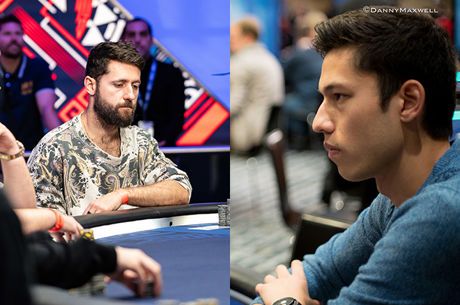2014 WSOP Main Event Hand Analysis: Five Key Hands From Three-Handed Play

It was an exciting conclusion to the 2014 World Series of Poker Main Event with Martin Jacobson emerging victorious over third-place finisher Jorryt van Hoof and runner-up Felix Stephensen to take home the $10,000,000 first-place prize and the bracelet.
There were plenty of key hands that took place among the 84 played last night. Let’s review five hands in particular during three-handed play that proved especially important as Jacobson positioned himself to take a big lead to heads-up with Stephensen and eventually to win.
Hand #255: Stephensen Check-Shoves With Queens Against Jacobson

The blinds were 600K/1.2M with a 200K ante. Jacobson opened for 2.7 million with K♣J♦ and Stephensen three-bet from the big blind to 8.2 million with Q♥Q♦. Jacobson called and the flop came 9♦8♥7♦. Stephensen checked, and Jacobson bet 6.2 million. Stephensen then shoved all in for 38.5 million — having Jacobson covered — and Jacobson snap-folded.
Review: The preflop action is what you would expect three-handed. Jacobson opens with a strong hand, Stephensen reraises with a stronger hand, and Jacobson decides to see a flop knowing he has position.
You can’t fault Jacobson for taking a stab at the pot when Stephensen checks to him, although it might have been preferable to check behind and see what the turn brought, especially since Jacobson had picked up an inside straight draw. Jacobson played brilliantly throughout, however, so you can’t fault his decision here too much. Meanwhile Stephensen’s check-raise shove was perfect.
Hand #260: Jacobson Gets Aces, Value from Stephensen
The blinds were still 600K/1.2M with a 200K ante. This time Jacobson opened for 3.6 million from the small blind with A♠A♦ and Stephensen called from the big blind with K♠J♥. The flop came 10♣7♥5♠, Jacobson led out for 4 million, and Stephensen called. The turn was the K♣, giving Stephensen a pair of kings, and after Jacobson bet 10 million, Stephensen called. The river brought the Q♠. Jacobson bet once more, this time 15 million, and Stephensen called a third time, losing the pot and over 30 million chips in doing so.
Review: On the break Daniel Negreanu and Phil Hellmuth discussed this hand with Hellmuth saying he hated how Stephensen played it and Negreanu disagreeing by saying he thought both Stephensen and Jacobson played it perfectly. Who’s right?
Stephensen could have done a better job of defining Jacobson’s range with a three-bet preflop, but just calling is also understandable because you don’t want to fold a strong hand like that three-handed if Jacobson responds with a four-bet. The flop float by Stephensen is interesting — that was the decision with which Hellmuth mainly took issue. I somewhat agree with him on that as Stephensen should know that Jacobson is too savvy of a player to fall for any float tricks that he might have in store for him. It was probably best to just fold there and move on to the next hand.
Stephensen doesn’t, however, and hits the turn hard to make his pair of kings. The bet-sizing from Jacobson should have been a sign to Stephensen that Jacobson wasn’t too worried about the king as he made a large bet of 10 million into a 15.8 million-chip pot. It’s hard to fold top pair three-handed, however, so the call was understandable.

The river then hits quite a few possible combinations Stephensen could have. Jacobson chooses to not slow down, though, and makes a bet of 15 million into a 35.8 million-chip pot. An argument could be made for checking with the intention of calling any Stephensen bet, but the way the hand played out, it was reasonable for Jacobson to feel that the river did nothing to improve Stephensen’s hand and thus a value bet is in order.
Stephensen’s hands are somewhat tied at this point. There’s over 50 million in the pot and he’s getting over 3-to-1 on his money to make the call. Antonio Esfandiari made the case for an all-in shove here stating that Jacobson would be hard pressed to make the call with just one pair, but with only 20 big blinds behind I don’t think Jacobson would fold if Stephensen shoved.
Hand #269: Van Hoof’s Crying Call Helps Stephensen Double
It’s the same level (600K/1.2M/200K). Jorryt van Hoof opened from the button to 2.6 million with J♣5♠ Stephensen defending his big blind by calling with 9♦8♠. The flop came 9♣4♣3♥ to give Stephensen top pair, and both players checked. The turn was the 5♥, giving van Hoof second pair. This time Stephensen led out for 4 million and van Hoof called. The river was the K♣ and Stephensen shoved for 17.1 million into the 14.4 million-chip pot. After tanking for some time, van Hoof made a reluctant call and lost.
Review: This was the beginning of the demise for the start-of-the-day chip leader. The preflop play for both players was standard with an open from the button and a call with connectors out of the big blind. I would have preferred to see van Hoof then make a continuation bet on the flop and utilize his position. Doing so would have saved him chips as Stephensen would have most likely check-raised. He didn’t, however, and hit second pair on the turn, thereby giving him reason to call the bet from Stephensen.
The river is interesting. I like Stephensen’s shove for two reasons. One, it prevents van Hoof from pushing him off of his hand. Two, it looks like he doesn’t want a call and will get value from hands precisely like the one that van Hoof has. The call from van Hoof is somewhat suspect and I’d argue a fold would have been the correct play. All he can really beat there is a bluff and there are a ton of combinations that Stephensen could have legitimately hit.
Hand #273: Van Hoof Misses His Draws Against Stephensen
They were still at 600K/1.2m with the 200K ante. Stephensen completed the small blind with 9♠6♣, leading to a raise of 3 million from van Hoof who was dealt A♠8♠ in the big blind. Stephensen made the call and the dealer put out a flop of 7♠5♦3♥, giving Stephensen a double belly-buster. He bet 4.3 million and van Hoof called. The turn was the 4♠, giving Stephensen a straight but also giving van Hoof the nut flush draw. Stephensen bet 8.5 million, and van Hoof called again. The river was the 4♥. Stephensen bet 15.5 million into the more than 30 million-chip pot, and van Hoof folded.
Review: I think preflop van Hoof should have raised more. His raise meant Stephensen had to call 1.8 million with a pot of 6 million, giving him nearly 3.5-to-1 on his money. There aren’t many hands that anyone is going to fold given that price, especially in a blind-versus-blind confrontation. A raise to 4 million or a little more would have been better. I like the lead out from Stephensen as it looks like a flop that would hit his hand (which it did). I also agree with the call by van Hoof as he has position and should want to see what the turn brings.
The turn is what you would expect from both players with Stephensen betting his made hand and van Hoof calling with his monster draw. The river I might have played a bit differently if I were Stephensen, as I think he lost value by leading out since it’s very unlikely the four helped van Hoof. There’s no way Stephensen is going to fold and van Hoof is only going to call that large bet in the rarest of instances. So why not check to van Hoof and let him try to win the pot the only way he can — by betting?
Hand #293: Jacobson Snap-Calls Shove, Eliminates Van Hoof

The blinds had increased to 800K/1.6M with a 200K ante. Van Hoof opened to 3.6 million from the button with A♥5♥. Jacobson three-bet to 9.2 million from the small blind with A♠10♣, then van Hoof responded with a four-bet shove for 46.2 million. He was immediately called by Jacobson and would be eliminated in third place after the board ran out 10♥5♠2♥Q♣Q♠.
Review: I think frustration had set in for van Hoof here as his best play would have been to call the three-bet and use his position postflop to determine his next move. Even folding would have been better than the four-bet shove for nearly 30 big blinds. Credit Jacobson for going in with a clear plan when he put in the three-bet. He knew what he was going to do if van Hoof shoved and wasted no time calling when the latter did just that.
Get all the latest PokerNews updates on your social media outlets. Follow us on Twitter and find us on both Facebook and Google+!









